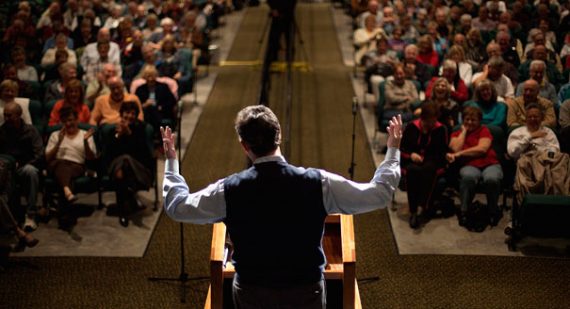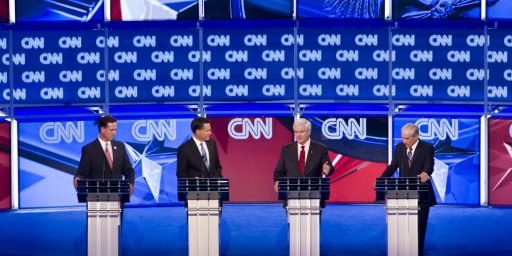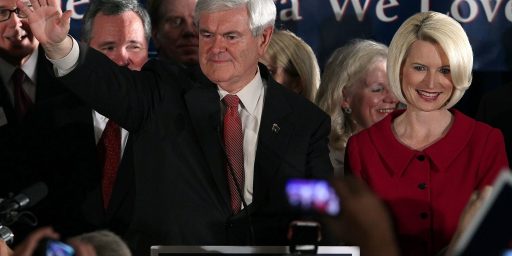Evangelicals Not United Behind Santorum After All
It seems that Saturday's vote by evangelical leaders in favor of Rick Santorum was less than meets the eye.
As James Joyner noted yesterday, a weekend meeting of leading evangelical leaders sponsored by Focus on the Family ended with a decision throw the support of a number of socially conservative leaders and organizations behind former Pennsylvania Senator Rick Santorum. Tony Perkins, the head of the Family Research Council, sought to put a positive spin on the event in an interview with The Wall Street Journal, but the signs of dissent were already there:
After three ballots, Mr. Santorum emerged with the votes of about 75 percent of the conservatives, with Mr. Gingrich gathering the remaining 25 percent, according to Tony Perkins, the head of the Family Research Council and unofficial spokesman for the meeting.
“Many people were surprised that the group came to a pretty strong agreement on a candidate,” Mr. Perkins said. “It will have some influence on the process. How much of an impact? We’ll see.”
Others said the inability of the group to settle on a single candidate means that the socially conservative wing of the party will split among several candidates in next week’s South Carolina primary. Sixty percent of voters in South Carolina’s 2008 GOP primary called themselves evangelical Christians, exit polls showed.
“I’m just saying that if you really, really want to elect a conservative, and not only win the election but the battle for the party, then everyone should get behind one candidate,” said Keith Appell, a Washington consultant for several conservative groups.
Even if the Christian leaders meeting in Texas had agreed to endorse a single candidate, it is not clear whether voters would follow.
“I don’t think what happened in that meeting will have any impact at all right here in South Carolina,” said Al Phillips, a pastor at First Baptist Church North Spartanburg. “I think people here make up their own minds.”
Mr. Phillips said, “The one thing that almost all of the members of my church agree on is that they are uncomfortable with Romney” due to his Mormon faith and what some say are his evolutions in policy on some social issues.
But he said that voters are split among Messrs. Santorum, Gingrich and Perry. “Santorum has really come on, but I don’t see him becoming the consensus choice, so I think what we are going to get is a Romney win here,” Mr. Phillips said. “I don’t like that, but you really don’t have a candidate who can draw all those people.”
The signs of dissent were apparent from the beginning really. Reports from those who were part of the conference call that Perkins held after the event concluded stated that there was confusion from the start over what the vote totals actually were for any of the ballots conducted, as well as over the question of what exactly happened on the final ballot. This may have been a sign that Perkins was trying to paper over differences between members of the meeting that have already become apparent in only the 48 hours since the event took place. Or, based on some of the allegations that have come out since then, it may be evidence that the vote itself was never really legitimate. At the very least, the unity that Perkins was trying to project clearly doesn’t exist, and it seems as though any effort to get social conservatives united behind a single candidate has been an utter failure.
The Washington Times suggests, for example, that something akin to a civil war has erupted between those who attended the meeting over what exactly happened, and what it means:
The meeting was called to avoid a continued division within social conservatives’ ranks.
But in back-and-forth emails, Protestant fundamentalist leaders who attended – most of them backing former House Speaker Newt Gingrich to be the anti-Romney candidate — are accusing Catholic participants of conniving to rig the vote.
They said they were conned into leaving after the second ballot on Saturday. They said pro-Santorum participants held a third ballot which Mr. Santorum won with more than 70 percent of the vote — far higher than the nine-vote margin he won on the first ballot.
“My view is that the vote was manipulated,” said a prominent social conservative who asked not to be named.
Now, a prominent evangelical political organizer is saying to others confidentially he has evidence that in a least one instance a participant was seen writing Mr. Santorum’s name on four separate ballots and putting them in the ballot box.
Evangelicals who left after the second ballot are now calling on Bob Fisher, a leader of the proceedings, to hold a recount.
Mr. Fisher has asked for a conference call Monday morning with Mr. Santorum and those who attended the Saturday meeting.
While the allegations of trickery cannot be corroborated, or at least haven’t been as of this moment, it is true that the total number of people voting dropped off in the third and final round of balloting, a fact which Perkins acknowledged in the conference call on Saturday. Whether this was due to people who had to leave early, which seems odd , or because they were tricked somehow into leaving so that Gingrich would be denied support. The other interesting dynamic, of course, is the Protestent-Catholic divide, partly because Gingrich himself is a Catholic just as Santorum is. What’s more, Gingrich converted to Catholicism after growing up Baptist. To the extent that what we’re seeing here is some kind of residual anti-Catholicism (and yes, such sentiments still exist among some evangelicals) it’s an odd way for it to play out.
It’s not hard to see why some evangelicals might want to manipulate the proceedings in Mr. Santorum’s favor. After all, he’s the one who has been rising in the polls of late, he has a far less tainted personal history, and he shares the evangelical vehement disdain for homosexuals. If these groups are going to stake their credibility on a candidate, Santorum seems like a far safer bet than Newt Gingrich.
Meanwhile, more than a few leaders who attended the meeting today reiterated their support for Newt Gingrich notwithstanding the vote in favor of Santorum:
Four Christian conservative leaders who attended a meeting of evangelicals in Texas last week issued a statement Monday reiterating their firm support for Newt Gingrich.
After the meeting ended on Saturday, Tony Perkins, president of the Family Research Council, announced that a “supermajority” had coalesced around Rick Santorum in the hope that a more unified evangelical vote could stop Mitt Romney and result in the nomination of a more reliable conservative. He said that participants had voted 85 to 29 to support Mr. Santorum.
But Mr. Gingrich’s supporters called the tally misleading because several pro-Gingrich participants had left before the final vote. While acknowledging that Mr. Santorum had won majority support, they said that initial news accounts of a “consensus” were incorrect.
“It is unfortunate that early press reports incorrectly stated that there was a consensus for Santorum, or that the ‘150 leaders endorsed Santorum.’ Such was not the case. Many there were and still are for Newt Gingrich,” said a statement issued Monday by J.C. Watts, a former Oklahoma congressman and a leading African-American conservative who is now a consultant; George Barna, a prominent Christian political analyst; the Rev. Jim Garlow, pastor of Skyline Church in La Mesa, Calif., and a leader of the campaign against same-sex marriage; and Richard Lee, a prominent Baptist pastor in Atlanta.
“While we truly respect both Rick Santorum and Rick Perry, we believe Newt Gingrich to be the only candidate that has the intellectual strength and the capacity to stop the left’s attack on morality, the economy, basic freedoms and our religious liberty.”
If nothing else, this would suggest that the weekend meeting was much more of a failure than Perkins portrayed to the media. The unity that he has tried to project since Saturday did not exist, and the effort to unify social conservatives behind a single candidate has, at least for the moment, failed. None of this is really surprising. As I noted this morning, there are already signs that even conservatives are starting to accept the inevitability of Romney winning the nomination. Given that, the fact that even these hardline leaders of the evangelical communities are unwilling to unite behind a single candidate is significant. It means that they know that whatever “Stop Romney” effort they mount now will be too little, too late so, rather than go all-in, they’re retreating to their corners and fighting their turf battles.
The big winner here, of course, is Mitt Romney. As we head into the final days before the South Carolina Primary, the more divided the conservative vote in the state is, the better off he is. Right now, Rick Santorum and Newt Gingrich are essentially dividing the evangelical vote, with some small portion going to Rick Perry. This allows Romney to concentrate on the voter-rich areas along the coast, which are less dominated by evangelicals, and increasingly include transplanted retirees from the Northeast and Midwest, a constituency that seems to be going for Romney quite strongly.
Perhaps these groups would have put more effort into the race if they’d been able to find a viable candidate earlier on. Rick Perry was supposed to be that guy, the two-and-a-half term Governor with broad appeal among social conservatives and a solid record on the issues they care about. Unfortunately for them, Perry self-destructed in September (and October, and November) and has never seemed to be able to recover from that. The other candidates that courted the evangelical vote, Michele Bachmann and Herman Cain principally, simply weren’t up to the task of being a serious candidate for President. So, social conservatives are left with Rick Santorum and Newt Gingrich, and it’s too late for them to make much of a difference. As someone who isn’t exactly sympathetic to what these people want to accomplish, I’ve got to say I find the whole thing pretty darn amusing.







When a 1/4 of these people think that Newt…. Newt... will be the savior of the family…..
The irony, the irony…. it hurts…
Apparently, even some of the religious zealots in the house are able to realize that if you want to put another zealot into power, it damn well better be a zealot who believes the exact same things you do…
Also,
Fixed that.
Also also,
Did these Protestant fundamentalists not get the memo that Newt is Catholic now? At least until this wife gets old? These people really are gullible morons.
Voter fraud amongst Conservatives….The irony, the irony… it hurts…
Schism? Splinter!!!
One group will hereafter be known as the Evangelical People’s Front, and the other will be known as the People Front for Evangelicals. Everybody needs to choose a side or a side may be chosen for you; the consequences perhaps fatal.
This isn’t at all surprising. Extreme Protestants always — always — splinter off into various groups and cliques. Inevitably that gets juxtaposed onto their politics. Hell, these people can’t even agree amongst themselves on denominations, much less doctrines. When they don’t get exactly their way they stamp their feet and walk off and throw hissy fits. Drive through any town or city in the Deep South and count the number of churches within the same ostensible denomination. 1st Baptist. 2nd Baptist. 3rd Baptist. United Baptist. So on, so forth. That’s not a coincidence.
Maybe the real problem is that they needed voter ID. That would have solved everything don’t ya think?
@Tsar Nicholas: That phenomenon is not exclusive among church people in the Deep South. Where I grew up on the Left Coast, our “denomination” of Baptists (one of 16 or so separate “Baptist denominations” listed in the Yellow Pages at the time) disaffiliated one of the churches in our group for changing it’s name to “(Name omitted) Community Church (affiliated with the (name of denomination).” The crime–lack of courage: the council believed that changing the name represented denial of God.
Mr Mataconis, it is not difficult to discover that Mr Gingrich did not ‘grow up Baptist’ as you say. He ‘grew up’ Lutheran. Converted to the Baptist church while a grad student at Tulane.
You should ask for a refund from your English teachers. Assuming you passed their courses.
I don’t think FOTF sponsored this or had anything to do with it. The Politico had a response from them that said they didn’t endorse anyone and Dobson wasn’t part of them anymore.
Being a Catholic is more complicated than it looks because it´s also a cultural affiliation, more than a Religious affiliation(For instance, Catholics have a much more visual vision of religion than Protestants). A Catholic convert is not going to get automatic sympathy from other Catholics..